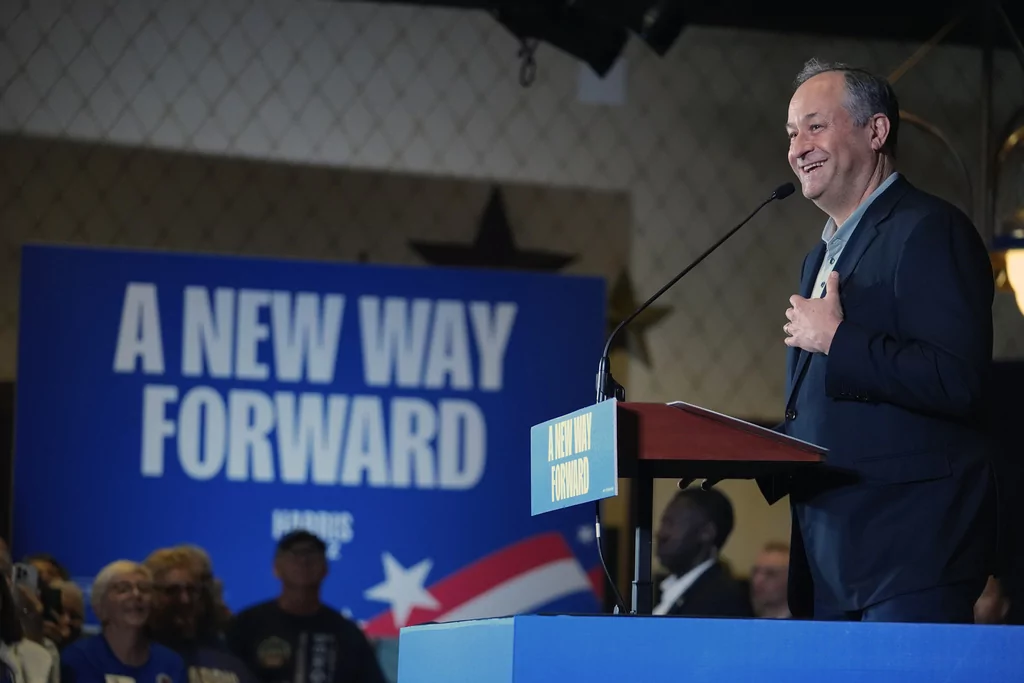

Second gentleman Doug Emhoff skirted around a chance to detail his wife and Vice President Kamala Harris’s economic policy in a new interview with MSNBC’s Jen Psaki.
In the one-on-one interview — which has been a rare occurrence from Harris’s presidential campaign — Psaki pressed Emhoff on what he tells people curious to understand more about Harris and her goals.
“You have a background in business; you have a background actually understanding the economy,” Psaki, a former White House press secretary under the Biden administration, started out.
“When people come to you, and they say, ‘I want to know more about your wife, I want to know more about the vice president, what she believes. And I really feel nostalgic for the age, the days of Trump and the economy during Trump.’ … What is the best argument? What do you tell them?”
Emhoff, who has been married to Harris since 2014, opted against diving into detail on the Democratic candidate’s campaign and instead explained what she was like when they met. Emhoff touted Harris’s knowledge of business, saying he didn’t feel that he had to “go into chapter and verse” on what he did for a living as she served as then-California Attorney General.
“Now, over the course — over these 11-12 years, I mean she is a capitalist. She’s pro-growth, pro-innovation,” Emhoff said. “She understands technology; she understands the interrelationships between needing, you know, a strong business community, but also making sure that workers are protected. And all these things can be true at the same time.”
He went on to further praise his wife, saying she has the ability to “understand all the connections” when it comes to discussing ideas with anyone from small business owners to space and tech entrepreneurs.
“A lot of these conversations then turn into policy,” Emhoff said. “So she’s constantly connecting the dots.”
Without further pointing to one policy stance from the Harris campaign in particular, Emhoff then turned his attention to former President Donald Trump. He accused the Republican of failing in his personal and business life by pushing for billionaire tax cuts and driving up debt.
“His only big policy now in between scapegoating immigrants is tariffs, which is going to cost the average American family about $4,000,” Emhoff said. “Goldman Sachs, economists, Moody’s, objective players in the economy have all said the economy will thrive under what Kamala is putting forth and will tank — in fact, Moody’s said we’ll go right into a recession — if he somehow gets back to the White House.”
In his newly found position as a top surrogate for Harris’ campaign, Emhoff has made several public media interviews to offer support for his wife, appearing on Good Morning America, Jimmy Kimmel Live, The Late Show with Stephen Colbert, and NBC News.
Meanwhile, Harris herself has eschewed such interviews, only giving her first solo interview with a major news outlet as the Democratic nominee last week. Previously, Harris hadn’t agreed to a similar interview as the Democratic pick until weeks after her running mate, Gov. Tim Walz (D-MN), was confirmed. In late August, CNN interviewed the pair together.
CLICK HERE TO READ MORE FROM THE WASHINGTON EXAMINER
The vice president has faced much criticism for being too walled off to the national media. Some have suggested this is intentional by her campaign, instead prioritizing local media, campaign events, town-halls, and social media, according to the New York Times.
Harris’s campaign has defended their media strategy, with a spokesman telling CNN, “She does a steady dose of media engagements because she believes speaking to a broad array of voters where they consume their news and information is important. It’s how you reach people where they are.”





